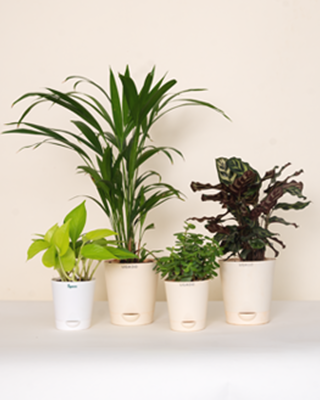Scientifically known as Prunus armeniaca, Apricots are a kind of stone fruit. They closely resemble peaches in appearance and nutritional value but there are a few things that, of course, set them apart.
Apricots are often beloved for their health benefits, sweet flavors, and vibrant appearance. Consuming home-grown fruits as compared to the commercial, store-bought ones is always a delight. So, why not grow those that bring multiple health benefits to the table with them!
Here's what you should know about growing apricots and the fruit in general:
• Apricots and Their Many Benefits

Apricots are a nutritional powerhouse, packed with essential vitamins, minerals, and antioxidants. They offer numerous health benefits and here are a few of them:
1. Rich in Nutrients
Apricots are packed with essential vitamins and minerals, including vitamin A, vitamin C, potassium, and dietary fiber. These nutrients support overall health and well-being.
2. Eye Health
Apricots are an excellent source of beta-carotene, which is converted into vitamin A in the body. Vitamin A is crucial for maintaining good vision and eye health, helping to prevent conditions such as age-related macular degeneration and cataracts.
3. Heart Health
The high potassium content in apricots helps regulate blood pressure and maintain a healthy cardiovascular system. Additionally, the dietary fiber in apricots can help lower cholesterol levels, reducing the risk of heart disease.
4. Digestive Health
Apricots are rich in dietary fiber, which promotes healthy digestion by supporting regular bowel movements and preventing constipation. Fiber also helps maintain a healthy gut microbiome.
5. Antioxidant Properties
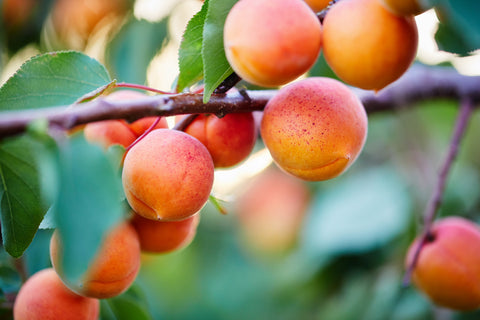
Apricots contain various antioxidants, including vitamins A and C, which help neutralize harmful free radicals in the body. This antioxidant activity may help reduce the risk of chronic diseases and slow down the aging process.
6. Skin Health
The vitamins and antioxidants in apricots contribute to healthy skin by promoting collagen production, improving skin elasticity, and protecting against UV damage. Apricot oil, extracted from apricot kernels, is also used in skincare products for its moisturizing and nourishing properties.
7. Weight Management
Apricots are low in calories and fat while being high in fiber, making them a satisfying and nutritious snack option for those looking to manage their weight.
8. Cancer Prevention
Some studies suggest that the antioxidants in apricots may have protective effects against certain types of cancer, although more research is needed to confirm these findings.
• Growing Apricots in Pots

If you happen to be one of those who enjoy planting and growing their own fruits and vegetables, the idea of apricot planting need not be so far-fetched! There are various different ways to grow fruits and vegetables and figuring out which way works best for the ones you want to grow is the first step to success!
If you're falling short of space, growing apricots in pots is a great idea and works well. You only have to keep in mind your watering schedules, the kind of pots you make use of, and the potting soil that you use to support your plant.
For that, here are a few care tips that you must make use of in order to be able to grow apricots successfully:
• Apricot Plant Care Tips

1. Sunlight
Apricot trees thrive in full sunlight, so choose a planting location that receives at least 6 to 8 hours of direct sunlight per day.
2. Soil
Apricots prefer well-draining soil with a pH level between 6.0 and 7.5. Avoid planting them in soil that is prone to waterlogging, as this can lead to root rot.
3. Watering
While apricot trees are relatively drought-tolerant once established, they still require regular watering, especially during dry periods and the growing season. Provide deep, infrequent watering to encourage deep root growth. Avoid overwatering, as this can lead to root rot.
4. Fertilization
Apply a balanced fertilizer in early spring before new growth begins. Use a fertilizer specifically formulated for fruit trees and follow the manufacturer's instructions for application rates.
5. Pruning
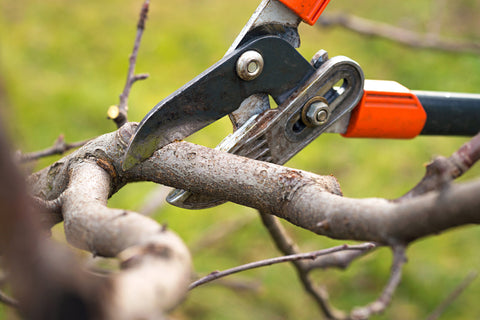
When to prune apricot trees? Pruning is essential for maintaining the health and shape of apricot trees. Prune them in late winter or early spring while they are dormant. Remove any dead, diseased, or crossing branches, as well as any water sprouts or suckers that emerge from the base of the tree.
6. Pollination
Most apricot varieties are self-pollinating, but when growing apricot, you can keep in mind that planting multiple trees can increase fruit production. Bees are the primary pollinators of apricot flowers, so encourage bee activity by planting bee-friendly flowers nearby.
7. Thinning
Thin the fruit clusters when they are still small to ensure that the remaining fruits have enough space to grow and develop properly. Thin apricots to about 4 to 6 inches apart on the branches.
8. Pest and Disease Management
Keep an eye out for common pests and diseases that affect apricot trees, such as aphids, spider mites, peach twig borer, bacterial canker, and brown rot. Use organic or chemical controls as necessary to manage pest and disease problems.
Buy Pest Control
9. Winter Protection
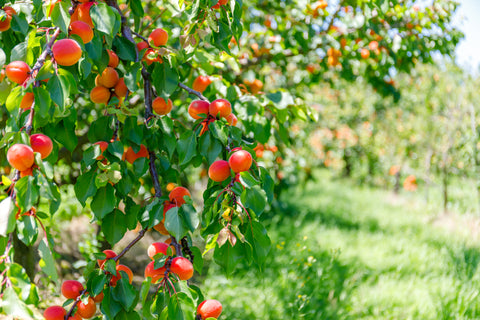
If you live in areas with cold winters, protect your apricot trees from frost damage by wrapping the trunks with tree wrap or using frost blankets during freezing temperatures.
10. Harvesting
Harvest apricots when they are fully ripe but still firm. They should have a deep orange color and a sweet aroma. Remember to handle the fruit carefully to avoid any bruising, and store them in the refrigerator for extended freshness.
• When to Plant Apricot Trees: The Best Apricot Growing Season
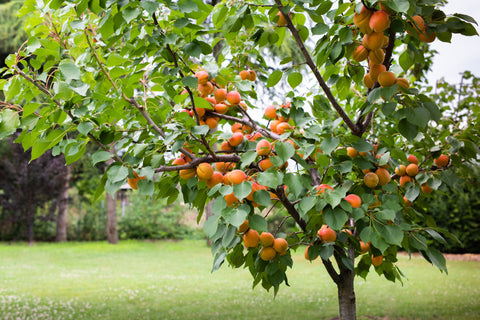
In India, the timing for planting apricot trees varies depending on the region's climate. In cooler northern regions like Himachal Pradesh and Jammu and Kashmir, planting in early spring or late fall is suitable. In warmer regions like parts of Punjab and Haryana, planting in fall or winter may be preferable to avoid extreme summer heat.
If you are growing apricots in pots, it can be done year-round in suitable weather. Starting seeds indoors in late winter applies to regions with colder winters.
Now that you know so much about growing apricots, when will you be growing them?
Buy Fruit Seeds











